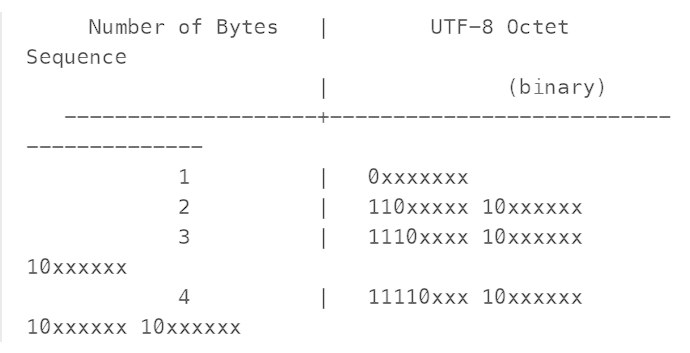[코테] 리트코드 비트 조작 393. UTF-8 Validation
393. UTF-8 Validation
문제 링크
https://leetcode.com/problems/utf-8-validation/description/
문제 설명
Given an integer array data representing the data, return whether it is a valid UTF-8 encoding (i.e. it translates to a sequence of valid UTF-8 encoded characters).
A character in UTF8 can be from 1 to 4 bytes long, subjected to the following rules:
For a 1-byte character, the first bit is a 0, followed by its Unicode code. For an n-bytes character, the first n bits are all one’s, the n + 1 bit is 0, followed by n - 1 bytes with the most significant 2 bits being 10. This is how the UTF-8 encoding would work:

x denotes a bit in the binary form of a byte that may be either 0 or 1.
Note: The input is an array of integers. Only the least significant 8 bits of each integer is used to store the data. This means each integer represents only 1 byte of data.
제한 사항
- 1 <= data.length <= 2 * 10^4
- 0 <= data[i] <= 255
입출력 예 #1
- Input : data = [197,130,1]
- Output : true
- Explanation : data represents the octet sequence: 11000101 10000010 00000001. It is a valid utf-8 encoding for a 2-bytes character followed by a 1-byte character.
입출력 예 #2
- Input : data = [235,140,4]
- Output : false
- Explanation : data represented the octet sequence: 11101011 10001100 00000100. The first 3 bits are all one’s and the 4th bit is 0 means it is a 3-bytes character. The next byte is a continuation byte which starts with 10 and that’s correct. But the second continuation byte does not start with 10, so it is invalid.
문제 풀이
class Solution:
def validUtf8(self, data: List[int]) -> bool:
# 문자 바이트만큼 10으로 시작 판별
def check(size):
for i in range(start + 1, start + size + 1):
if i >= len(data) or (data[i] >> 6) != 0b10:
return False
return True
start = 0
while start < len(data):
# 첫 바이트 기준 총 문자 바이트 판별
first = data[start]
if (first >> 3) == 0b11110 and check(3):
start += 4
elif (first >> 4) == 0b1110 and check(2):
start += 3
elif (first >> 5) == 0b110 and check(1):
start += 2
elif (first >> 7) == 0 :
start += 1
else :
return False
return True
Comments